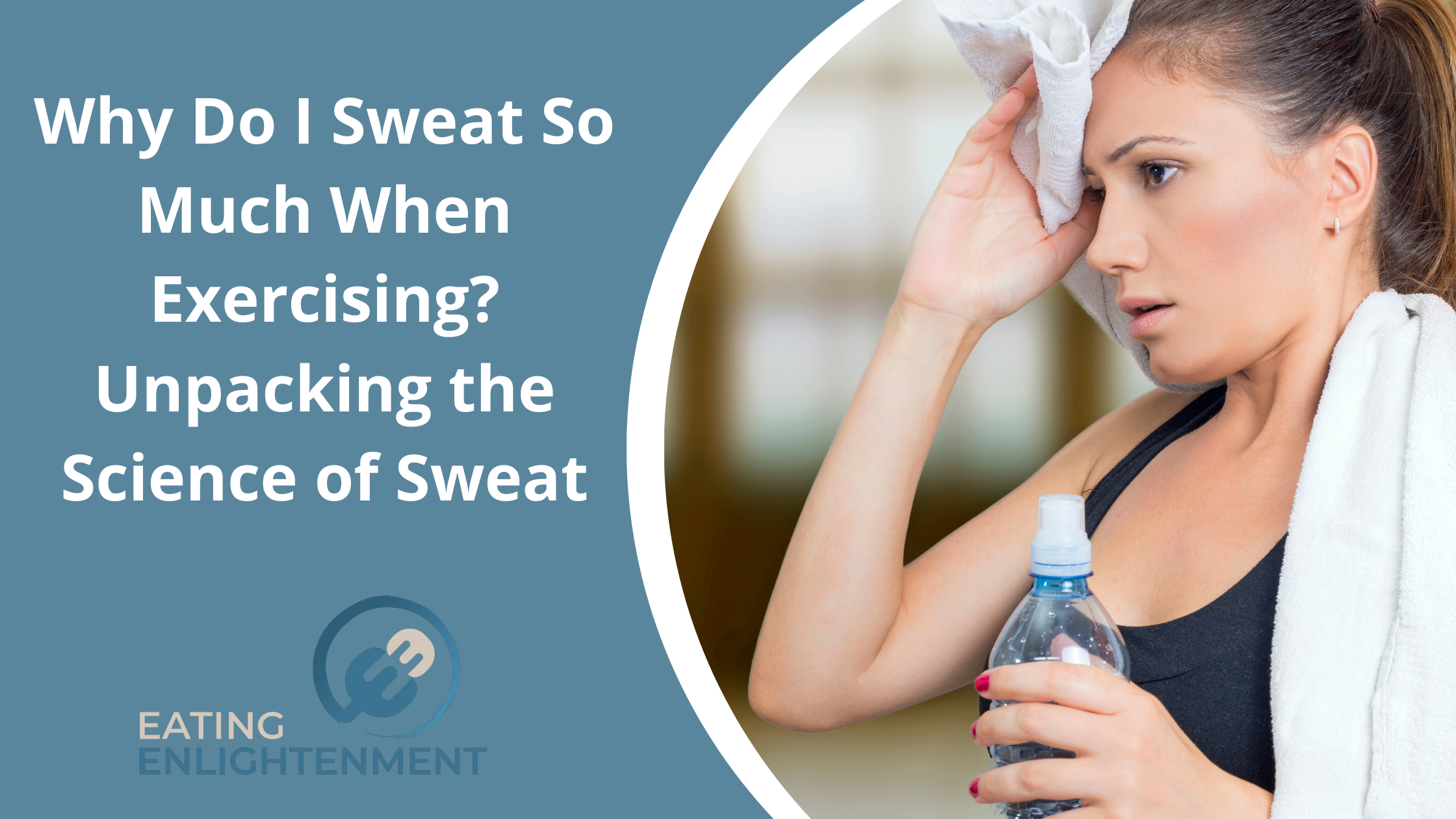It’s a feeling that most of us have experienced – sweating profusely when we exercise. But have you ever stopped to wonder why our bodies react this way?
Perhaps you’ve even worried if it means you’re not fit enough or your body is doing something wrong. Fear not!
In this blog post, we’ll dive deep into the science of sweat and uncover the reasons behind those popular sweat patches.

Sweating and Exercise Overview
First off, let’s start by understanding that sweating is a good thing. It’s your body’s natural way of regulating your internal temperature and keeping you cool when things heat up.
During exercise, your body temperature rises as your muscles work harder. This heat triggers your sweat glands to produce sweat, evaporating from your skin to cool you down.
This is why you’ll often notice that you sweat more during intense workouts or in hot weather – your body sweats is simply working harder to keep you cool.
Now, you may wonder why some people sweat more than others during exercise. The truth is that many factors can impact how much you sweat, such as genetics, age, gender, and body weight itself.
- Men tend to sweat more than women, and younger people tend to sweat more than older adults. If you’re overweight, you may also sweat more because your body has to work harder to move around and carry excess weight.
- Another factor that can impact your sweat levels is your fitness level. Counterintuitive as it may seem, people who are more physically fit tend to sweat more.
- This is because their bodies are better at cooling themselves down, producing more sweat to get the job done. So, if you’re sweating buckets during your workouts, it’s a sign that your body is doing well!
- But what about those embarrassing sweat patches that form on your clothes? While they may be unsightly, they’re a good sign. When sweat develops on your skin, it starts to evaporate and cool you down. However, if you wear tight or thick clothing that doesn’t allow for airflow, the sweat can’t evaporate as effectively.
- Finally, let’s remember the role of hydration when it comes to sweating. When you exercise, your body loses fluids through sweat, so it’s essential to stay hydrated to avoid dehydration.
If you’re not drinking enough water, your body will produce less sweat since it needs to conserve fluids.
This can lead to overheating and other health concerns, so make sure you’re drinking plenty of water before, during, and after your workouts.
Is it normal to sweat a lot during exercise?

It’s perfectly normal to sweat a lot during exercise! Sweating is your body’s natural way of cooling itself down. When we work out, our body temperature rises, and sweating helps bring it back down. Every person is different, and some may sweat more than others due to factors like exertion level and individual physiology.
Sweating can also be a sign of fitness. Fit athletes tend to sweat more because they generate more heat and need more sweat to cool down. However, it’s important to remember that excessive sweating can lead to dehydration, affecting your metabolism and blood flow to the muscle mass. So, make sure to stay hydrated!
Remember, there’s no “normal” amount to sweat. We’re all unique, and our bodies respond to exercise in different ways. So, next time you’re working out and start to sweat, embrace it! It’s just a sign that your body is doing its job.
Do you sweat more as you get fitter?
Isn’t it fascinating how our bodies work? You may have noticed that the more fit you become, the more you sweat during workouts. And you’re not alone in wondering why this happens.
The reason behind this is interesting. As you get fitter, your body becomes more efficient at cooling. It does this by sweating. When you exercise, your internal body temperature often rises, and your body sweats to cool down.
So, if you’re becoming more fit and noticing that you’re sweating more, it’s a good sign! Your body is simply responding to all the hard work you’re doing and getting better at keeping you cool.
But remember, it’s essential to stay hydrated, especially if you’re sweating a lot during workouts. Drinking water replenishes the fluids lost through sweat and helps your body function properly.
So, keep up the great work, and don’t worry about the extra sweat. It’s just your body’s way of saying, “Keep going! You’re doing amazing!”
Does sweating mean you are burning fat?

Have you ever wondered if sweating excessively during a workout means you’re burning fat? It’s a common question, and the answer might surprise you.
Sweating is your body’s way of cooling itself down. It doesn’t directly burn fat or calories. The amount you sweat doesn’t equal the number of calories you burn.
Some people might sweat a lot during a workout, while others might not, even if they’re doing the same exercise at the same intensity.
However, sweating can be a sign that you’re exercising at a level that does burn calories. When we exercise, our bodies need to burn calories to give us energy. This process generates heat. To the heat stress keep our bodies from overheating, we sweat.
So, while sweating doesn’t burn fat, it can be a sign that you’re burning calories, leading to fat loss over time. But remember, the most important thing is to find a type of exercise you enjoy and stick with it. Consistency is vital when it comes to losing weight and getting healthier.
And remember to stay hydrated! When we sweat, we lose water. So, it’s essential to drink enough water before, during, and after your workouts to replace what you lose through sweat.
So keep up the excellent work, and don’t worry too much about how much you’re sweating. Focus instead on how you feel and on making healthy choices each day. That’s the true path to achieving your fitness goals.
What does it mean if you sweat a lot during exercise?
Sweating is your body’s way of keeping itself cool. When you exercise, your body heats up. To bring the temperature down, your body releases sweat. As the sweat evaporates from your skin, it helps cool your body down. So, the more you work out, the more heat your body produces, and the more you might sweat.
Do fit people sweat more?

When you exercise, your body heats up. This heat is produced because your muscles are working hard. To cool itself down, your body sweats. The sweat then evaporates from your skin, which helps your body to cool down.
Now, here’s the cool part. As you become fitter, your body gets better at cooling itself down. How does it do this? By sweating more! That’s right – the fitter you get, the more you might sweat. Your body starts to sweat sooner and more during your workouts. Your body knows it will work hard, so it gets ready to cool down immediately.
If you’re noticing that you’re sweating more during your workouts, it’s not a bad thing at all. It’s a sign that you’re getting fitter, and your body is becoming more efficient at cooling itself down.
Does sweating indicate a good workout?

Sweating is your body’s way of cooling itself down. When you exercise, your body heats up. To prevent overheating, your body releases sweat. As the sweat evaporates from your skin, it helps to cool your body down.
But here’s the exciting part: the amount you sweat doesn’t necessarily tell you how hard you’ve been working out or how many calories you’ve burned. Everyone is different, and some people might sweat a lot while others might not, even if they’re doing the same exercise at the same intensity.
On the other hand, as you become fitter, your body’s heat-regulating system can become more efficient. This means you might start sweating sooner in your workouts or sweat more overall. But this isn’t because you’re burning more calories or fat; it’s simply because your body is improving at keeping itself cool!
Is it reasonable to sweat more when working out?
Sweating is your body’s natural way of cooling itself down. When you exercise, your body temperature rises, and to further regulate body temperature and prevent overheating, your body releases sweat. As the sweat evaporates from your skin, it helps cool your body down.
But here’s something interesting: everyone sweats differently. Some people might find themselves covered in sweat after a light jog, while others might barely break a sweat even after an intense workout. This doesn’t necessarily mean one person works harder or is more fit than the other. It’s just how different bodies respond to exercise.
So, is it reasonable to sweat more when working out? Well, sweating is a natural and essential part of exercising, but it’s not a measure of how effective your workout is. The best indicators of a good workout are how you feel during and after it. Are you feeling stronger? More energetic? Those are signs of a successful workout.
Can too much sweating ever be a problem?

While sweating is a natural and healthy process that helps your body stay calm, there are times when excessive sweating, known as hyperhidrosis, may occur. This means your body sweats more than it needs to, even when you’re not exercising more sweating, or feeling hot.
Now, you might be asking, “Why does this happen?” Sometimes, there isn’t an apparent reason why some people sweat excessively. This is known as primary hyperhidrosis. However, there are also times when excessive sweating can be a sign of certain health conditions like diabetes, heart conditions, or an overactive thyroid. It can also be a side effect of some medications.
So, what should you do if you think you’re sweating too much? The first step is to talk to a healthcare professional. They can help determine if your excessive sweating is a sign of other health issues or if you have hyperhidrosis. If you do have hyperhidrosis, don’t worry; there are treatments available that can help manage the condition.
Are there treatments out there for excessive sweating?
- One standard treatment for excessive sweating and hyperhidrosis is antiperspirants. These are similar to what you might use daily, but they contain more potent ingredients. Some doctors recommend a product with aluminum chloride hexahydrate, which can be more effective at blocking sweat.
- Another treatment option is a process called iontophoresis. This involves using a machine that sends mild electrical currents through water to your skin, which can help reduce excess sweating too.
- In some cases, healthcare professionals may recommend injections of botulinum toxin, commonly known as Botox. This isn’t just for wrinkles! It can also be used to block the nerves that cause sweating temporarily.
- There are also prescription cloth wipes, which contain medication that can help control sweating. You wipe them on your skin each day.
- Medications can also be used to treat hyperhidrosis. These include anticholinergics, which block specific nerve signals and help reduce sweating.
- In some instances, dietary changes can be recommended. In rare cases, there are more intensive treatments like microwave thermolysis of sweat glands or even surgery.
Why Do I Sweat So Much When Exercising Conclusion
Sweating while exercising may seem a nuisance, but it’s a vital body function. It’s a sign that your body is working hard to keep you healthy and calm, and it can even indicate your fitness level.
So the next time you feel self-conscious about those sweat patches, remember that it’s just your body doing its job. Embrace the sweat, stay hydrated, and wear comfortable workout clothes, to keep yourself relaxed and performing at your best.




